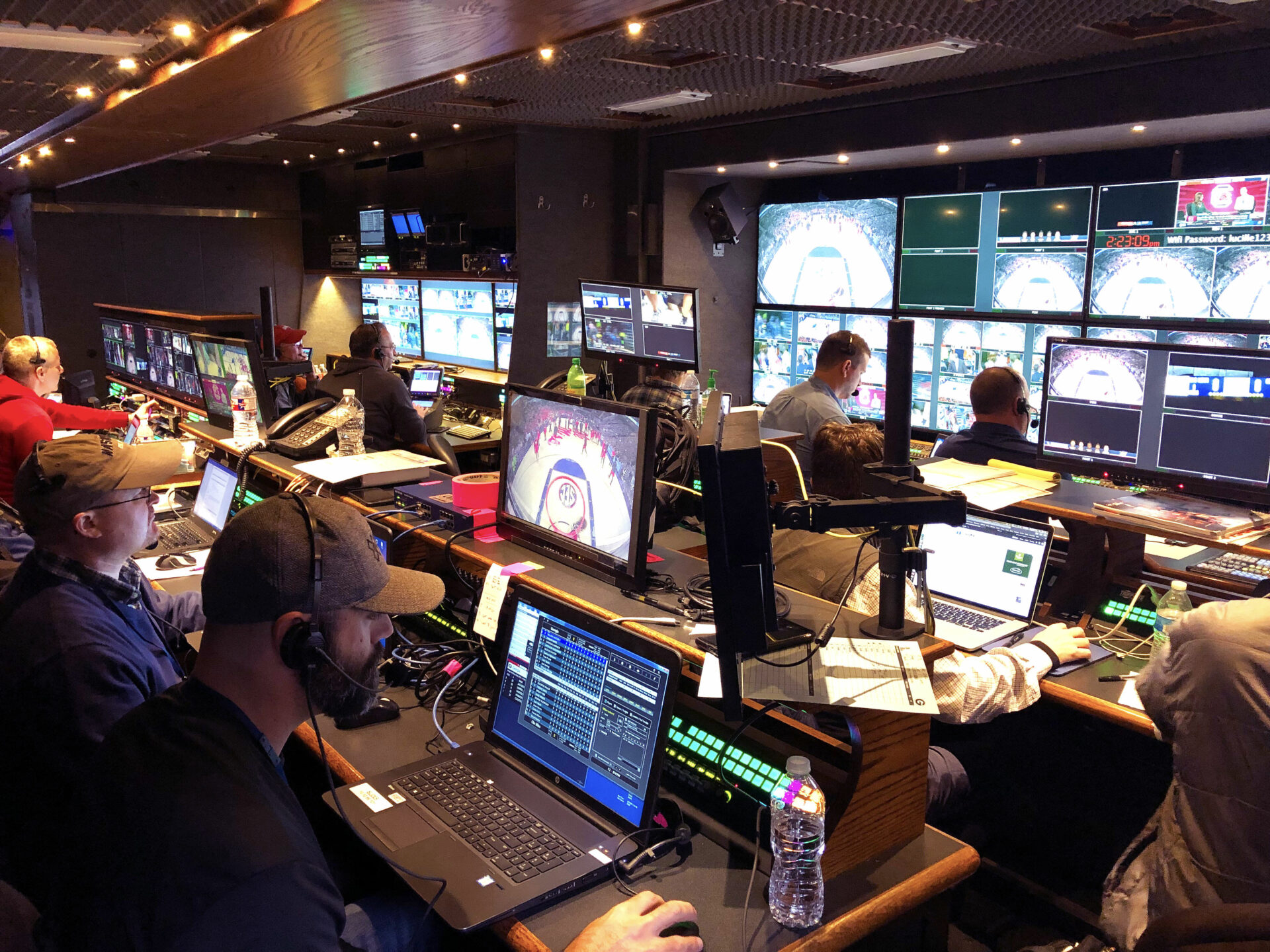Story contributed by Briana Florez
bfflorez@go.olemiss.edu

Behind the live stream of your favorite team is another team of hardworking individuals working to produce the cast.
Surely you have seen the statistics graphic that flashes on your screen when the announcer mentions the number of turnovers in the game, the highlight of a slam dunk before a commercial break, or the shot of an excited fan after his or her team’s player got fouled but managed to make the layup?
There are many people who are responsible for creating the magic that you see on your TV at home during a sporting event. Thanks to the ESPNU Campus Connection program, 14 Ole Miss broadcast journalism students got to see these talented “magicians” at work during the Ole Miss v. Georgia men’s basketball game last Saturday.
Many team members are freelancers who reach out to crewers to find gigs. Our campus connection host Howard Miller, a managing producer for ESPN, told students trusting the people you work with is vital in this business.
“I’ve had people ask me, do you know these people that you work with? And it’s like, not this game,” Miller said. “Yet I trust them to do their job, and they trust me.”
From the outside, the TV truck looked similar to a trailer that high schools might hold history class in, yet on the inside it was dark and lit up by screens, panels, and switches. There was a lot of friendly banter between workers a few hours prior to the game, but as tipoff approached, the conversation turned serious and became clear it was time to work.
One of the first people we interacted with in the truck was Francesco Granieri, an ESPN graphics interface coordinator. For this game, however, he clarified he was slider operator.
From the atmosphere in the truck, it appeared as if mistakes are costly. Yet, Granieri said they are more common than many realize.
“Mistakes happen more often than you think. Sometimes the viewing audience is aware of it, sometimes they’re not aware of it,” Granieri said. “We’re all human. In my particular job, there’s no buffer between me and what’s on the air.”
Early wake-up calls and constant travel are a huge part of the job, but Granieri said traveling is the best part for him. He is on the road 220 nights a year, but for those with children like his two brothers and cousin who are also ESPN employees, extensive traveling can be tough.
After watching pre-game preparations in the truck, students walked onto Craddock Court in The Pavillion, where the director was having his camera meeting with the camera operators. The director was high-energy and knew exactly what he wanted each camera operator to focus on during the game.
Camera operator Benjamin Smith was given the responsibility to shoot Ole Miss head coach Kermit Davis giving his pre-game locker room talk to the team. It was very noticeable that Smith was young, yet had a certain confidence about him. Smith said working the camera comes naturally to him because he’s been doing it since he was 15.
“Shooting the game is probably the easiest part,” Smith said. “I don’t want to say it’s not hard, but really you when you’ve been doing it a while, you kind of get used to it. It’s like any other job, except for my office changes all the time.”
Students then filed back into the truck for the game to watch the crew work live. One takeaway I had is there is never a dull moment on the job.
There was one person that was in a separate room from the rest of the group the entire time, and it’s a job that Miller told students is often underappreciated, but probably the most important—the audio guy. There were so many sounds coming from every direction as he pressed buttons and switches every second.
We looked at audio before the game, and I joked out loud and said, “You must have to be really good with technology to do this job,” and the man working audio turned around with a smile on his face and said, “Oh yeah.”
Communication and personality were the words of the day. Several crew members said that to succeed in this business you have to be a good communicator with a likable personality.
“Meet everyone you can be friends with, everyone that you meet in the business. They might just be a lowly camera operator with the school or something, but meet them, talk to them, know how to do what they do,” Smith said. “That’s really the name of the game of this whole business.”

